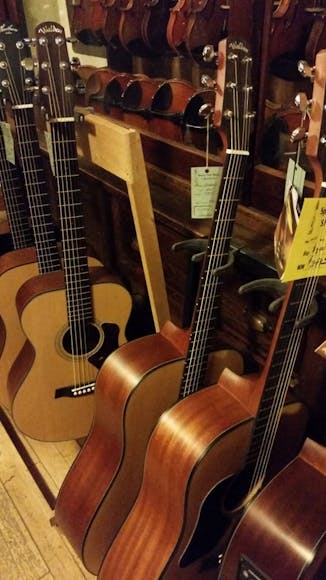Playing music, for some, might be confined to memories of picking out squeaky tunes on a plastic recorder in elementary school. Others might passionately play and get to know their instruments throughout their lives.
But what happens when these instruments start to reach the end of their lives?
Many discarded instruments end up in landfills. The metals used in brass and wind instruments are not biodegradable. Small pieces of metal, like tin cans, will rust and flake into the atmosphere after about 100 years, but something as large as an instrument takes much longer.
Certain instruments, like pianos, are being thrown away in record numbers. Pianos experienced peak production levels in America decades ago, with around 365,000 sold in 1910. Now, many of these are reaching the end of their lifespan.
Spruce Tree Music & Repair, a locally owned shop on the East Side of Madison, was started with the mission to repair stringed instruments and continues to do that today, in addition to selling new and used instruments.
Wil Bremer, who founded the shop in 1980, said that while he doesn’t think of Spruce Tree in exclusively environmental terms, there are aspects of the business that are intertwined with conservation and recycling.
“We do restore a lot of older instruments, and though we don’t think of it so much in terms of recycling or resource use, that clearly has some benefit,” Bremer explained.
If they can repair something rather than replace it, that’s a plus — first for the customers, but also for the environment.
Bremer said the real problem arises from the mass production of lower-quality instruments.
“The stuff that doesn’t work from day one is the stuff that bothers me, because that’s just pure waste,” he said.
He said that Spruce Tree is conscious of the environment and has always been aware of the need to recycle. He described how the world of music is changing to become more environmentally aware, especially when it comes to recycling materials.
“I remember years ago taking a box of old strings to a recycling place before recycling was as big as it is now, and they just looked at me funny, like ‘what are we gonna do with all this mixed metal,’” he said. “Now, there’s a company that actually has a program to recycle guitar strings.”
Spruce Tree partners with global instrument manufacturers like Arcos Brasil, a maker of violin bows who is heavily involved in rainforest conservation.

In fact, many manufacturers of stringed instruments, like violins, and fretted instruments, like guitars, are conscious of forest preservation, according to Bremer.
Some woods used to create these high-end instruments are now endangered due to mass deforestation. Bremer pointed out a guitar made of Brazilian Rosewood in a glass case among other instruments. This particular guitar could not be transferred overseas, as the wood in it is now heavily restricted and endangered.
There are other efforts, both nationwide and globally, in which music and the environment become related.
Some of these efforts, like Orquesta de Instrumentos Reciclados de Cateura, or The Recycled Orchestra, are born out of necessity. Cateura, a small town in Paraguay where residents suffer extreme poverty, is shadowed by a large landfill.
Favio Chávez, a local music teacher, saw an opportunity within the trash to create the youth orchestra. All the instruments are crafted from repurposed waste material found in the landfill.
While people realize they shouldn’t be throwing away trash carelessly, they also need to realize we shouldn’t be throwing away people, Chávez said in a trailer for a documentary about Orquesta de Instrumentos Reciclados de Cateura. Residents of Cateura experience the negative effects of waste that wealthier countries deposit there every day.
“The world sends us garbage. We send back music,” Chávez said.
U.S. performance and environmental activist group, Vocal Trash, creates instruments out of landfill trash and blogs about how to reuse and recycle everyday trash items.
Vocal Trash, whose tagline is “Think … before you throw it away!” suggests donating old guitar strings to Share Your Strings, a business selling jewelry and other trinkets made from the strings.
Widespread efforts like these and local efforts in Madison are bridging the gap between music and environmental consciousness. Ultimately, though, Bremer said his favorite part about Spruce Tree Music is this:
“The people, the music and the history.”
Gracie Wallner is the features editor for the Daily Cardinal. To read more of her work, click here.






